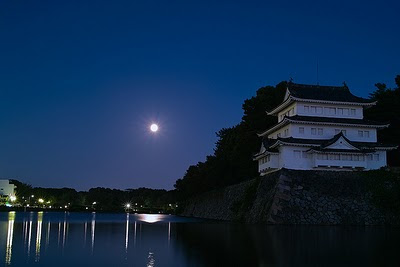 |
| Full Moon over Nagoya Castle; photo by ka_tate |
What is to be learned from cold moonlight? In Japan, the moonlight has an empty longing to it that resonates deeply with the Japanese spirit. Hatsumi Sensei has made reference to the author Yasunari Kawabata who, on winning the Nobel prize for literature in 1968, spoke movingly about the moon and it's deep companionship with the Japanese. Here he quotes the priest Myoe,
"On the night of the twelfth day of the twelfth month of the year 1224, the moon was behind clouds. I sat in Zen meditation in the Kakyu Hall. When the hour of the midnight vigil came, I ceased meditation and descended from the hall on the peak to the lower quarters, and as I did so the moon came from the clouds and set the snow to glowing. The moon was my companion, and not even the wolf howling in the valley brought fear. When, presently, I came out of the lower quarters again, the moon was again behind clouds. As the bell was signalling the late-night vigil, I made my way once more to the peak, and the moon saw me on the way. I entered the meditation hall, and the moon, chasing the clouds, was about to sink behind the peak beyond, and it seemed to me that it was keeping me secret company."
Hatsumi Sensei writes about his intentions for sharing Ninpo:
There is a saying: "The village that shines in the moonlight leaves a different impression in the souls of different people." The Chinese characters for strength and nothingness are both read "mu" in Japanese. Therefore, nothingness is the same of strength.Sensei also wrote, "There is no village on which the moon does not shine, the moon lives in the mind of the gazer."
My intention is to introduce you to the world of Ninpo through the method of expression based on nothingness.
What do you see in the moonlight? Where does the light fall? Does it illuminate something beautiful for you or melancholy? One way to grasp our training is to approach it with the clarity of moonlight. Don't train with ego, just allow the nothingness of the teachings to fall over you. You can find great joy if you sacrifice yourself to your training. Have the feeling of surrender or sutemi. And like the moonlight, understanding will flash in your eyes.
Soke talks about finding a purity of focus in life so that there is no worry for death,
In order to do so, we must have a clear purpose in our daily life. If we live our daily lives with sutemi, the mind of budo, and the passion of the artist who pours his soul into his works, we can almost forget about death, and never regret our life at the moment of its end.Moonlight is nothingness yet shines on all the world. That is a clear purpose. And the strength of Mu.
Comments
Post a Comment